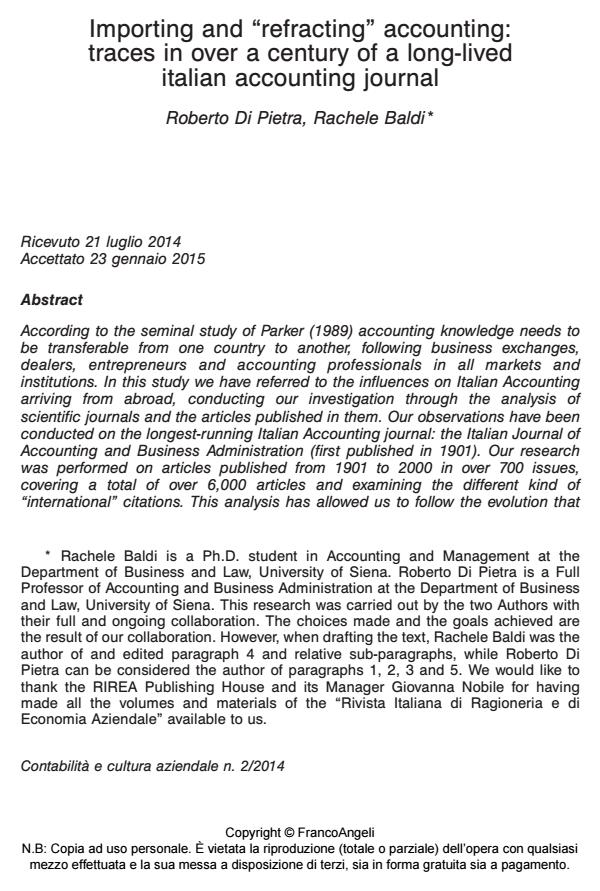Importing and "refracting" accounting: traces in over a century of a long-lived italian accounting journal
Journal title CONTABILITÀ E CULTURA AZIENDALE
Author/s Roberto Di Pietra, Rachele Baldi
Publishing Year 2015 Issue 2014/2
Language English Pages 28 P. 79-106 File size 165 KB
DOI 10.3280/CCA2014-002008
DOI is like a bar code for intellectual property: to have more infomation
click here
Below, you can see the article first page
If you want to buy this article in PDF format, you can do it, following the instructions to buy download credits

FrancoAngeli is member of Publishers International Linking Association, Inc (PILA), a not-for-profit association which run the CrossRef service enabling links to and from online scholarly content.
According to the seminal study of Parker (1989) accounting knowledge needs to be transferable from one country to another, following business exchanges, dealers, entrepreneurs and accounting professionals in all markets and institutions. In this study we have referred to the influences on Italian Accounting arriving from abroad, conducting our investigation through the analysis of scientific journals and the articles published in them. Our observations have been conducted on the longest-running Italian Accounting journal: the Italian Journal of Accounting and Business Administration (first published in 1901). Our research was performed on articles published from 1901 to 2000 in over 700 issues, covering a total of over 6,000 articles and examining the different kind of "international" citations. This analysis has allowed us to follow the evolution that has characterized Accounting in Italy in relation to the influences connected to importing ideas, knowledge, practices, concepts and institutions from other countries and the waves of knowledge observed in a hundred years.
Keywords: Importing Accounting; Waves of Knowledge; International Citations.
- Accounting research trends during the last 20 years: evidence from Italy Alessia Patuelli, Jonida Carungu, in CONTABILITÀ E CULTURA AZIENDALE 2/2017 pp.65
DOI: 10.3280/CCA2016-002004 - Historical Perspective of Structuration Theory: The Case of the Society for the Preservation of the Christian Art Monuments in Pavia (1875-1908) Michela Magliacani, in CONTABILITÀ E CULTURA AZIENDALE 1/2020 pp.33
DOI: 10.3280/CCA2020-001003
Roberto Di Pietra, Rachele Baldi, Importing and "refracting" accounting: traces in over a century of a long-lived italian accounting journal in "CONTABILITÀ E CULTURA AZIENDALE" 2/2014, pp 79-106, DOI: 10.3280/CCA2014-002008